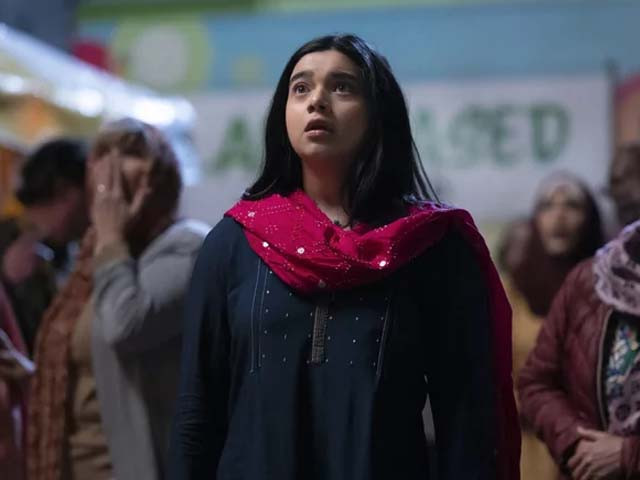Ms. Marvel, the latest offering in the saga of the Marvel Cinematic Universe (MCU), has been garnering praise and rave reviews. However, the show added an extra dimension to its narrative when it touched upon the partition of the Indian subcontinent. While many appreciated the fact that this aspect of history was finally being discussed in mainstream media as a result of this show, others felt that one scene in particular faltered in the manner in which the partition of India and Pakistan was discussed.
In the aforementioned scene, Ms. Marvel’s nani (grandmother), played by veteran actress Samina Ahmed, was shown to say,
“My passport is Pakistani, my roots are in India. And in between all of this, there is a border. There is a border marked with blood and pain. People are claiming their identity based on an idea some old Englishmen had when they were fleeing the country.”
It depicts the anguish of many Pakistani and Indian families that suffered because of the blood-soaked migration of 1947. Indians blame Mohammad Ali Jinnah for partition, and Pakistanis argue that the division of Punjab and Bengal was rejected by the Muslim League but supported by Congress. This is part of an irreversible history with competing narratives that are diametrically opposed to one another. However, what is problematic about the dialogue is the removal of agency from Indian Hindus and Pakistani Muslims and deflecting the responsibility of the partition on to the British.
It is important to recognise that based on the contemporary Indian Hindu narrative, the Mughals and other Muslim invaders were imperial colonialists who usurped the land of Bharat, which was a peaceful place that offered refuge to the persecuted; like the Jews and the Zoroastrians. Bharatiya Janata Party (BJP) Hindus view Muslims as outsiders, with different dietary practices (especially on consuming beef), and caricature them as “jihadis” and “madrassa chaps”.
It does not matter how secular Muslims are, as in the case of Bollywood Muslim actors with Hindu spouses, all of them are painted with the same brush. Based on the works of the Rashtriya Swayamsevak Sangh (RSS) ideologues, Savarkar, Golwalkar, and Upadhyaya, they view Muslims separate from the nation of Hindus, as their holy places, religion, heroes, and dietary practices, are all foreign to the land of Bharat (ancient land of India). At best, Muslims are viewed as Hindus who went astray from their sanatan dharma (Hindu faith), and who should be invited to return to their original faith, a process referred to as ghar waapsi (return to home). It is this narrative that has led to the systemic prejudice against Muslims in India and their otherisation by the BJP government that increasingly moves towards a Hindu Rashtra (Hindu state).
Pakistani Muslims have their own narrative, as Islam is to them what Bharat is to Indian Hindus. It is therefore not surprising that Pakistanis are not really taught about the ancient Mauryan Empires and instead start their history from the invasion of Sindh by Muhammad Bin Qasim in 712 CE. They view successive Muslim invaders like Ghazni, Ghauri, and Abdali as heroes, which is reflected from the names given to Pakistani missiles. In some sense, Pakistani heroes of the Middle Ages emerge from Arab, Persian, Afghan, and Central Asian origins. Indeed, many of them trace their lineage as the descendants of foreign invaders who conquered parts of India and decided to settle down here. This creates a rift between Indian Hindus and Pakistani Muslims, whose respective Maratha and Mughal heroes are the villains of the other community.
It is therefore not surprising that Sir Syed Ahmad Khan referred to Hindus and Muslims as two nations, distinct from one another. Notwithstanding the secularism of Jinnah, who led a constellation of Dalits with Jogendra Nath Mandal and Ahmadis with Sir Zafarullah Khan, subsequent Pakistanis clamoured for an Islamic state. This has led to the systemic discrimination against Pakistani Christians and Pakistani Hindus, and the institutionalised persecution of Ahmadis.
Amidst such firebrand Indian Hindus and Pakistani Muslims are the minority voices of those caricatured as “liberals”, who face the greatest ire by their respective communities. Therefore, with such seething prejudice that is willfully perpetuated 75 years since the blood-soaked partition of 1947, should blame still be placed on the long dead generation of British imperialists and all agency be stripped from the current generation of Indians and Pakistanis, especially when their mutual discord is traced back hundreds of years before the British ever stepped foot in the Indian subcontinent?



COMMENTS
Comments are moderated and generally will be posted if they are on-topic and not abusive.
For more information, please see our Comments FAQ